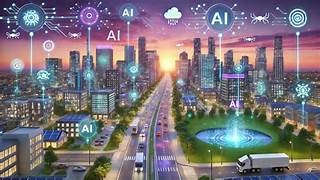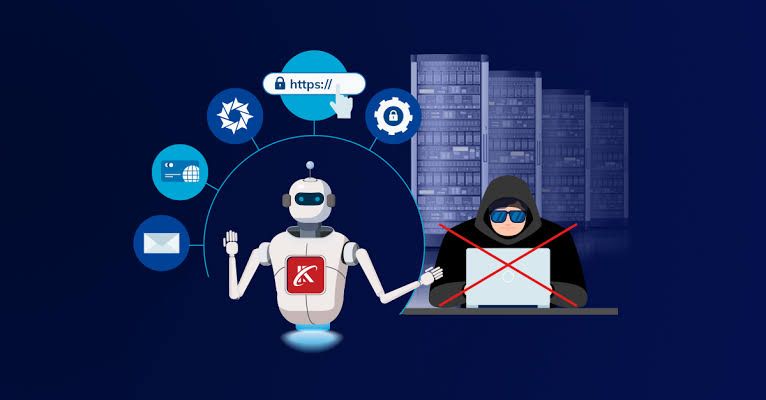
AI-Powered Personal Assistants of the Future
AI-powered personal assistants are set to become even more intelligent, intuitive, and emotionally responsive. With advancements in machine learning, NLP, and voice recognition, these tools will go beyond simple task management to offer personalized support across all aspects of daily life. From smart homes to healthcare and education, they will streamline workflows, manage time, and enhance user experiences. While they promise convenience and efficiency, concerns like data privacy, ethical use,
✨ Raghav Jain

Introduction
In just a few short years, artificial intelligence (AI) has gone from a futuristic concept to an everyday reality. From asking Siri to set an alarm to letting Alexa control our smart lights, AI-powered personal assistants are already part of our daily lives. But what we’re experiencing now is just the beginning.
As AI continues to evolve at lightning speed, personal assistants are poised to become smarter, more human-like, and deeply integrated into every aspect of our lives—transforming the way we live, work, learn, and connect with the world around us.
Imagine a future where your AI assistant knows your mood before you say a word, anticipates your needs before you express them, and coordinates your life seamlessly across devices and environments. That’s the world we’re heading toward.
In this article, we’ll explore how AI-powered personal assistants are evolving, the technologies driving them, the industries they’ll transform, and the challenges and ethical considerations that come with them.
As we delve deeper into the 21st century, the convergence of artificial intelligence (AI) and personal computing is poised to revolutionize the way we interact with technology and manage our daily lives. The AI-powered personal assistants of the future, far surpassing the capabilities of today's virtual assistants, promise to be intelligent, proactive, context-aware, and deeply integrated into the fabric of our existence. These advanced AI companions will evolve from simple voice-activated tools to sophisticated digital entities capable of understanding our needs, anticipating our desires, and seamlessly assisting us across a multitude of tasks and domains. The trajectory of AI development, coupled with advancements in natural language processing (NLP), machine learning (ML), contextual awareness, and personalized learning, suggests a future where our AI assistants will be indispensable partners, augmenting our cognitive abilities, enhancing our productivity, and enriching our overall well-being. The transformative potential of these future AI-powered personal assistants lies in their ability to provide proactive assistance, offer hyper-personalized experiences, seamlessly integrate across devices and platforms, enhance productivity and efficiency, improve health and well-being, facilitate lifelong learning, manage complex tasks, foster creativity, provide companionship and emotional support, and ultimately reshape human-computer interaction.
One of the most significant advancements in future AI personal assistants will be their ability to provide proactive assistance. Unlike today's assistants that primarily respond to explicit commands, their future counterparts will leverage sophisticated predictive analytics and contextual awareness to anticipate our needs before we even articulate them. By continuously learning from our routines, preferences, and past interactions, these AI assistants will proactively offer relevant information, schedule reminders, suggest optimal routes, and even initiate tasks autonomously, streamlining our days and freeing up our mental bandwidth for more complex endeavors. For instance, an AI assistant might automatically adjust the home temperature based on predicted weather patterns and the user's preferences, or proactively order groceries when it detects low stock of frequently used items.
The AI personal assistants of the future will offer hyper-personalized experiences that go far beyond simple customization. By deeply understanding our individual preferences, learning styles, communication patterns, and even our emotional states, these assistants will tailor their interactions, recommendations, and assistance to an unprecedented degree. They will adapt their language, tone, and the way they present information to suit our individual needs, creating a truly personalized and intuitive user experience. For example, an AI assistant could curate news articles based on a user's specific interests and reading level, or provide personalized learning pathways tailored to their individual learning style and pace.
Seamless integration across a multitude of devices and platforms will be a hallmark of future AI personal assistants. They will move beyond being confined to smartphones or smart speakers and will be seamlessly embedded in our wearables, vehicles, smart homes, and workplaces. This ubiquitous presence will allow them to provide consistent and contextually relevant assistance regardless of the device we are currently using. For instance, an AI assistant could start a task on a smart speaker, seamlessly transition it to a laptop, and then provide relevant information on a smartwatch as the user moves throughout their day.
Enhancing productivity and efficiency will be a core function of future AI personal assistants. They will act as intelligent task managers, capable of prioritizing tasks, scheduling meetings, managing emails, and even automating routine administrative work. By learning our work habits and collaboration patterns, they can facilitate more efficient teamwork and streamline workflows, allowing us to focus on higher-level strategic thinking and creative endeavors. An AI assistant could, for example, automatically schedule meetings based on the availability of all participants, draft initial responses to emails, and even generate summaries of lengthy documents.
The potential of AI personal assistants to improve our health and well-being is immense. They will be capable of monitoring our vital signs through wearable devices, providing personalized fitness and nutrition recommendations, reminding us to take medications, and even detecting early signs of health issues based on subtle changes in our behavior and physiological data. They could also provide mental wellness support through guided meditation exercises or by connecting us with appropriate resources when needed. For example, an AI assistant could track a user's sleep patterns and suggest adjustments to their sleep schedule or recommend exercises based on their fitness goals and current activity levels.
Future AI personal assistants will also serve as invaluable tools for lifelong learning. By understanding our knowledge gaps and learning preferences, they can curate personalized educational content, recommend relevant courses and resources, and even act as intelligent tutors, providing on-demand explanations and feedback. This will empower individuals to continuously learn and adapt in a rapidly changing world. An AI assistant could, for instance, identify a user's interest in a new subject and then proactively provide relevant articles, videos, and online courses to facilitate their learning.
Managing complex tasks involving multiple steps and various sources of information will be a key capability of future AI personal assistants. They will be able to orchestrate intricate processes, gather necessary information from different sources, coordinate with other individuals or systems, and ensure that tasks are completed efficiently and accurately. For example, planning a complex trip involving flights, accommodation, and activities could be seamlessly managed by an AI assistant that handles all the logistics based on the user's preferences and constraints.
While primarily focused on practical assistance, future AI personal assistants could also foster creativity by providing inspiration, suggesting new ideas, and facilitating brainstorming sessions. By understanding our creative processes and preferences, they could offer relevant examples, suggest alternative approaches, or even help us overcome creative blocks. An AI assistant could, for instance, analyze a user's past creative work and suggest new stylistic elements or offer prompts to spark new ideas.
Beyond their functional capabilities, future AI personal assistants could also provide companionship and emotional support. By understanding our emotional states through natural language processing and potentially even physiological data, they could offer empathetic responses, engage in comforting conversations, and even alert human contacts if they detect signs of distress. While not a replacement for human connection, they could provide valuable support, especially for individuals who may experience loneliness or isolation.
Ultimately, the AI-powered personal assistants of the future will fundamentally reshape human-computer interaction. They will move beyond the current paradigm of direct commands and responses to become more intuitive, proactive, and collaborative partners. This evolution will lead to a more seamless and natural integration of technology into our lives, augmenting our abilities and enhancing our overall experience of the digital world. The development of these advanced AI assistants will raise important ethical considerations regarding privacy, data security, and the potential for over-reliance, which will need to be carefully addressed to ensure their responsible and beneficial integration into society. However, the potential to empower individuals and enhance human potential through these intelligent digital companions is immense, promising a future where technology truly serves as an extension of ourselves
The Evolution of AI Assistants
AI-powered personal assistants have come a long way since their early days of simple voice commands. What started with basic scheduling and weather updates has now evolved into context-aware, intelligent systems that learn from user behavior.
Key milestones in AI assistant development:
- 2011 – Apple introduced Siri, one of the first widely used voice-activated assistants.
- 2014 – Amazon launched Alexa, a home-based smart assistant integrated with Echo devices.
- 2016 – Google unveiled Google Assistant, offering deep integration with Android and smart home tech.
- 2020s – AI models like ChatGPT, Claude, and Bard emerged, enabling natural, human-like conversation.
Now, these assistants are moving beyond passive tools into proactive companions capable of learning preferences, making decisions, and holding meaningful conversations.
1. Hyper-Personalization and Emotional Intelligence
Future AI assistants will move from general task managers to hyper-personalized life companions. Using data from your phone, wearable devices, smart home systems, and even your tone of voice or facial expressions, they’ll develop an in-depth understanding of:
- Your daily habits
- Preferences and goals
- Emotional states and stress levels
- Health patterns and sleep cycles
This enables emotionally intelligent AI, which adapts responses and actions based on your mood or mental state. For example, it could offer a calming playlist when you’re stressed or suggest taking a break if it senses fatigue.
2. Multimodal and Human-Like Interaction
The future of AI assistants goes beyond voice or text. With multimodal capabilities, you’ll interact with them using:
- Voice and tone
- Facial expressions
- Gestures and gaze
- Text, images, and even real-time video
Imagine talking to a digital avatar of your AI assistant that not only understands your words but also reads your face, reacts appropriately, and uses body language.
Advancements in natural language processing (NLP) and generative AI will make conversations more fluid, nuanced, and human-like—making it hard to distinguish whether you’re speaking to a person or a program.
3. Seamless Integration Across Devices and Environments
Tomorrow’s AI assistants won’t live in a single device—they’ll follow you across platforms, locations, and technologies. Whether you're on your smartphone, smartwatch, smart car, AR glasses, or even a public display, your assistant will always be available.
This ambient AI presence means:
- Your assistant starts your morning routine as soon as you wake up.
- It switches from your phone to your car’s dashboard during your commute.
- It coordinates with your workplace software, smart home devices, and health apps in real time.
The result is a frictionless experience, where you don’t need to command the assistant—it simply knows what to do, when to do it, and how to help you best.
4. Revolutionizing Productivity and Workflows
AI-powered assistants will dramatically enhance how we work by becoming collaborative partners in our day-to-day tasks. They’ll automate repetitive tasks, optimize schedules, and even help with creative projects.
Real-world examples:
- Drafting and editing emails, reports, or presentations.
- Organizing meetings and handling calendar conflicts.
- Generating insights from data or summarizing large documents.
- Conducting market research or preparing strategy suggestions.
For freelancers, entrepreneurs, and knowledge workers, AI assistants will serve as virtual business partners, freeing up time for more strategic, creative, or high-value work.
5. Revolutionizing Healthcare and Wellbeing
AI assistants are set to become personal health advisors—guiding us toward better physical and mental wellness.
Capabilities will include:
- Monitoring vitals from wearable devices
- Notifying you of irregular patterns (like elevated heart rate or poor sleep)
- Reminding you to hydrate, stretch, or take medication
- Offering mental health check-ins and mindfulness exercises
In the future, AI could alert doctors of potential health issues before symptoms become visible, or even support elderly users with fall detection, medication tracking, and companionship.
6. Enhancing Education and Lifelong Learning
In education, AI assistants will become personal tutors, tailoring learning experiences based on a student’s pace, strengths, and weaknesses.
They’ll support:
- Real-time doubt clearing
- Language translation and pronunciation coaching
- Personalized curriculum planning
- Engaging learning via AR/VR and gamification
Lifelong learners and professionals will benefit from assistants that recommend relevant courses, explain complex concepts, and keep them updated on industry trends—making learning continuous, engaging, and personalized.
7. Intelligent Home and Smart Living
AI-powered assistants will be the central nervous system of the smart home. They’ll manage everything from lighting and temperature to security and grocery shopping, making our living spaces more responsive and comfortable.
Examples:
- Adjusting lighting and curtains based on time of day and mood
- Suggesting recipes based on available ingredients and diet
- Automatically placing online orders when supplies run low
- Detecting leaks, smoke, or unusual activity and alerting you or emergency services
These AI assistants will not only anticipate needs but also take action without being explicitly asked—making your home truly “smart.”
8. Travel, Navigation, and Lifestyle Assistance
Planning a trip in the future? Your AI assistant will handle everything:
- Finding deals on flights and hotels
- Packing reminders based on your destination and itinerary
- Translating local language in real time
- Navigating foreign cities using AR overlays through smart glasses
Lifestyle enhancements could include fashion advice, grocery shopping, restaurant reservations, and even suggesting fun weekend activities based on your preferences and mood.
9. Ethical Concerns and Privacy Challenges
While the possibilities are exciting, the rise of AI assistants also raises serious concerns:
- Data privacy: How much personal data should we share? Who owns it?
- Bias and fairness: Will AI assistants be trained on inclusive, diverse data sets?
- Dependency: Will overreliance on AI impact critical thinking or social interaction?
- Security: Can assistants be hacked or manipulated?
Developers and governments must work together to ensure ethical AI standards, transparent data usage policies, and user control over personal information.
10. The Rise of Conscious Companions?
In the far future, AI assistants could evolve from tools to companions—entities with personalities, values, and even a form of artificial empathy.
They may remember your history, understand your emotional growth, and support your personal development. This raises philosophical questions:
- Can AI understand love, grief, or dreams?
- Should we treat them as conscious beings?
- What rights, if any, should advanced AI have?
While we’re not there yet, this future is being actively explored in AI ethics and robotics labs around the world.
Conclusion
The AI-powered personal assistants of the future won’t just help us manage our calendars or play our favorite songs—they will be our collaborators, caregivers, educators, and companions. As they grow more intelligent, responsive, and integrated into our lives, they will help us live healthier, smarter, and more productive lives.
But with great power comes great responsibility. It’s up to us—as users, developers, and policymakers—to ensure that this technology is developed with transparency, empathy, and fairness.
We are on the brink of an AI-driven revolution—one that will redefine what it means to live, work, and thrive in the 21st century. The question is not whether AI assistants will shape the future—but how we choose to shape them.
Q&A Section
Q1: What are AI-powered personal assistants?
Ans: AI-powered personal assistants are software programs that use artificial intelligence to perform tasks or services based on user commands. They help with scheduling, reminders, internet searches, and more.
Q2: How will future AI assistants differ from today’s versions?
Ans: Future AI assistants will be more context-aware, emotionally intelligent, and proactive. They will predict needs, adapt to user preferences, and offer more human-like conversations.
Q3: What technologies support the development of advanced AI assistants?
Ans: Technologies like natural language processing (NLP), machine learning, voice recognition, and neural networks power advanced AI assistants, making them smarter and more intuitive.
Q4: In what areas will AI assistants become most useful?
Ans: AI assistants will become highly valuable in healthcare, education, smart homes, business productivity, and personal wellness by offering tailored and real-time support.
Q5: Will AI assistants be able to understand human emotions?
Ans: Yes, future AI will include emotional intelligence, allowing assistants to recognize tone, mood, and facial expressions, and respond empathetically to user needs.
Q6: Can AI assistants improve productivity and time management?
Ans: Absolutely. They can organize tasks, prioritize activities, automate repetitive work, and help users stay focused by minimizing distractions and reminding them of deadlines.
Q7: How secure will AI-powered personal assistants be?
Ans: Future AI assistants will use advanced encryption and privacy protocols, ensuring user data is protected, though users must remain aware of ethical and security risks.
Q8: Will AI assistants replace human jobs?
Ans: While AI may automate some tasks, it is more likely to augment human capabilities, allowing people to focus on higher-level, creative, or emotional tasks.
Q9: How will AI assistants integrate with smart devices?
Ans: AI assistants will seamlessly connect with smart home devices, wearables, and appliances to create a fully automated and personalized living experience.
Q10: What are the ethical concerns surrounding AI assistants?
Ans: Key concerns include data privacy, surveillance, over-reliance on technology, and biased decision-making. Ethical development and regulation are essential for responsible use.
Similar Articles
Find more relatable content in similar Articles

AI in Drug Discovery: Faster C..
Artificial Intelligence is rev.. Read More

Smart Cities: How Technology I..
Smart cities are transforming .. Read More

Solar-Powered Wearables: Can T..
Solar-powered wearables are re.. Read More

AI-Powered Hackers: The New Cy..
In 2025, cyber threats have en.. Read More
Explore Other Categories
Explore many different categories of articles ranging from Gadgets to Security
Smart Devices, Gear & Innovations
Discover in-depth reviews, hands-on experiences, and expert insights on the newest gadgets—from smartphones to smartwatches, headphones, wearables, and everything in between. Stay ahead with the latest in tech gear
Apps That Power Your World
Explore essential mobile and desktop applications across all platforms. From productivity boosters to creative tools, we cover updates, recommendations, and how-tos to make your digital life easier and more efficient.
Tomorrow's Technology, Today's Insights
Dive into the world of emerging technologies, AI breakthroughs, space tech, robotics, and innovations shaping the future. Stay informed on what's next in the evolution of science and technology.
Protecting You in a Digital Age
Learn how to secure your data, protect your privacy, and understand the latest in online threats. We break down complex cybersecurity topics into practical advice for everyday users and professionals alike.
© 2025 Copyrights by rTechnology. All Rights Reserved.